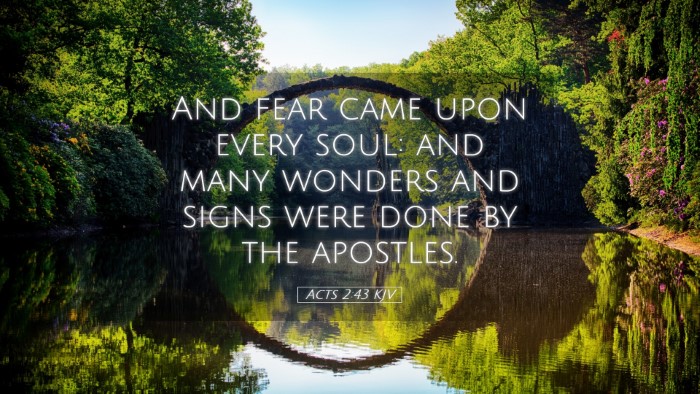Commentary on Acts 2:43
Acts 2:43 states: "And fear came upon every soul: and many wonders and signs were done by the apostles." This verse follows the profound events of Pentecost and signifies the impact of the early Church’s ministry on the community. The text indicates a response to the miraculous and authoritative actions of the apostles. Here is a synthesis from various public domain commentaries.
Contextual Background
The Book of Acts, authored by Luke, details the early history of the Christian Church. The preceding verses describe the outpouring of the Holy Spirit, which empowered the apostles to preach and perform miracles. Acts 2:43 captures the immediate aftermath of these events, illustrating the awe and reverence that characterized the early believers.
Insights from Public Domain Commentaries
Fear and Awe
Matthew Henry comments on the profound sense of fear that enveloped the community. He interprets this fear not as dread, but rather as a deep respect and recognition of God’s power manifesting through the apostles. Such fear is a natural response to witnessing divine acts and represents a wholesome reverence for God’s presence among His people.
Albert Barnes elaborates on the concept of "fear" by linking it to the signs and wonders performed by the apostles. He notes that the early Church operated in an atmosphere charged with divine authority, creating an environment where the miraculous was expected. This expectation grounded the community in trust and awe towards God, which is essential for spiritual growth.
The Role of Signs and Wonders
Adam Clarke suggests that the signs and wonders served as divine validation of the apostles’ ministry. These miracles were not solely for spectacle but illustrated the authentication of the Gospel message. Clarke’s perspective underscores that these acts were integral to the establishment of the Church, solidifying the faith of believers and drawing in those who witnessed these remarkable events.
Types of Signs and Their Significance
- Healing: The healing of the sick and miraculous recoveries represented God's compassion and power.
- Exorcism: Delivering individuals from demonic possession illustrated victory over spiritual forces and showcased Christ as the ultimate conqueror of evil.
- Prophetic Revelations: These reinforced the message of salvation and provided guidance to the early Church, fostering a deeper understanding of God’s will.
Community Impact
The atmosphere of fear and the occurrence of wonders were catalytic for community engagement and spiritual fortitude. The early Christians formed a cohesive unit, and their shared experiences of the miraculous fortified their resolve. Matthew Henry remarks that this spirit of unity, bolstered by divine expressions, encouraged believers to gather regularly for worship and fellowship.
Albert Barnes highlights that the fear of God coupled with community signs propelled the growth of the Church. The early Christians were not merely spectators; they were participants in a vibrant faith experience that transformed lives and communities alike.
Theological Implications
Acts 2:43 portrays a significant theological truth about the nature of the Church. It emphasizes that the Church is a living entity, animated by the Holy Spirit, and equipped for ministry through signs and wonders. Adam Clarke posits that the miracles performed were essential for the Church's credibility, emphasizing that God actively works in and through His people, making His presence known through their lives.
The Modern Application of Fear and Wonders
Today's Church can draw parallels from this verse regarding the importance of invoking a similar sense of awe and reverence. The occurrences of God’s miraculous works serve as a testament to His active engagement with humanity. Matthew Henry asserts that fostering an atmosphere of worship can lead to a resurgence of signs and wonders in modern congregations.
The Call for Faithfulness
The response to the miracles and the reverence shown by the community call modern-day believers to examine their faithfulness. Albert Barnes encourages current Christians to seek God earnestly and anticipate His divine activity in their lives and communities. The expectation of divine intervention encourages faithful living and active participation in the mission of God.
Conclusion
Acts 2:43 stands as a potent reminder of the dynamic nature of the early Church and its relationship with God. The mixture of fear, reverence, and the wonder of signs calls believers of all ages to recognize the majesty of God at work among His people. The insights drawn from Matthew Henry, Albert Barnes, and Adam Clarke enrich our understanding of this verse and encourage contemporary believers to engage with this historical narrative, applying its truths in their own lives and churches.
As pastors, students, theologians, and scholars reflect on Acts 2:43, may they be inspired to cultivate a sense of awe and expectancy that invites God’s transformative power into the everyday experiences of their faith communities.


